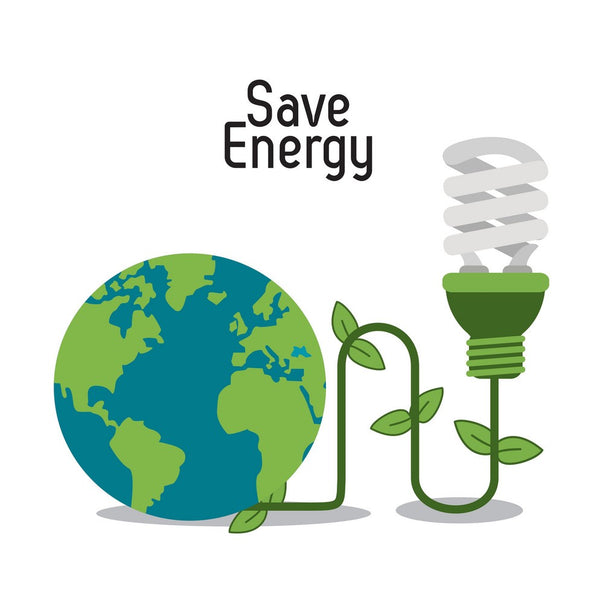Solar Power Blog

How To Save Energy at Home: 10 Tips
With gas and electricity prices on the rise, it's never been more important to keep an eye on your energy usage. A few simple changes to your daily routine will not only help you save on your energy bills but will also make your home more sustainable. Need some pointers? Read on for 10 effective ways of saving energy at home.
1. Carry Out a Home Energy Audit
Before you start making any significant changes to your everyday habits, it makes sense to carry out a home energy audit. Many companies offer this as a service, but you can undertake an audit yourself with little effort. Inspect your property for things like air leaks that might lead to unwanted drafts. If you spot any, rectify the issue immediately.
If possible, you should also inspect things like insulation and determine whether it needs to be replaced. If you have heating systems and air conditioning units installed, these also need to be checked for efficiency. Equipment that's not performing optimally is going to place a significant drain on domestic energy supplies.
2. Think About Switching Energy Suppliers
If you're looking to cut energy costs, it may be worth changing suppliers. However, in the United States, this is only possible in certain regions. Only a handful of states have deregulated energy.
Furthermore, these select states don't all offer regulated natural gas and electricity supplies. Provided you have access to deregulated energy, switching suppliers can save you a small fortune over a year.
3. Install Solar Panels
If changing energy suppliers isn't an option, investing in solar panel technology is a cost-effective way of slashing your energy bills. Furthermore, you'll be using a wholly renewable source of energy with minimal impact on the environment.
A smaller solar panel array can be used to supplement your daily energy needs or charge electric vehicles. Meanwhile, larger arrays can cater to all your energy requirements and help heat your home efficiently.
4. Invest in Smart Home Devices
Even if you invest in solar panel technology, you'll need to ensure you're using more energy than is necessary. Smart home devices are highly effective at monitoring your energy consumption. Smart thermostats put you in full control of your heating systems.
Once installed, you can always enjoy remote access via mobile apps. This remote access not only allows you to adjust your thermostat from anywhere, but it also means you can always track energy consumption.
5. Replace Inefficient Cold Appliances
The appliances you use daily consume a considerable amount of electricity. To save energy and lower your power bills, think about switching out older appliances for more energy-efficient ones. Start with the worst offenders like refrigerators and freezers.
In many homes, these appliances account for more than ten percent of an annual electricity bill. This is understandable. After all, these appliances need to always remain on to maintain consistent temperatures. Once you've switched to a more efficient model, make sure you're not overloading shelves with produce. The more items a refrigerator needs to be cool, the more energy it will consume.
6. Change Your Cooking and Kitchen Habits
If you're someone who loves cooking from scratch, you're likely using a lot of energy. Around 5 percent of domestic energy consumption goes on cooking and kitchen appliances. This includes electric ovens, microwaves, and stovetops. An easy way to use less energy is to use your microwave more.
7. Embrace LED Lighting
Every home needs lighting, so this is one area you should focus on when looking to save energy. Where possible, use LED bulbs. They're generally more expensive than halogen ones, but use only a fraction of the energy. Furthermore, LED bulbs last for longer, making that initial one-off premium a sensible long-term investment.
8. Only Heat Rooms You're Using
Heating an entire home is expensive. To minimize energy consumption, make sure you're only heating spaces you're using regularly, like living rooms. Kitchens benefit from residual heat from ovens, so there's no need to waste money on heating these rooms.
It's also important to remember that radiators will continue to produce heat for a while after your central heating systems are turned off. Remember to turn off your thermostat at least half an hour before heading to bed or leaving the house to save as much energy as possible.
9. Draft-Proof Your Home
Just about every home experiences drafts. Tackling drafts not only makes your home more comfortable but also ensures you're spending less on heating to compensate for them. Easy fixes include kitting out exterior doors with draft excluders.
You should inspect the seals around windows for any signs of wear that might be allowing cold air in. If you have an exposed fireplace that's not being used, think about sealing it up or investing in a chimney balloon to keep your interior insulated against cold air.
10. Unplug Idle Appliances
When you're in a hurry, it's tempting to simply hit the standby button on televisions or electronic appliances. However, appliances still use a considerable amount of energy when in standby mode.
To ensure you're not using electricity when you don't need to, make a habit of unplugging an appliance when it's not being used. If you're constantly charging laptops, tablets, and smartphones, invest in a smart plug that will stop electricity flowing once a battery has been sufficiently charged.
These are just a few of the ways you can curb your energy consumption at home. Even minor changes to your daily routine can yield big savings. Meanwhile, while some approaches like installing solar panel technology may be expensive, they'll help you save a fortune in the long run and mitigate the impact of the cost of living rises.
Author Bio:
Zoe Dromgoole is the Marketing Executive at Wood Flooring Ireland. Wood Flooring Ireland sells bespoke engineered wood flooring such as herringbone flooring throughout the entire country.
